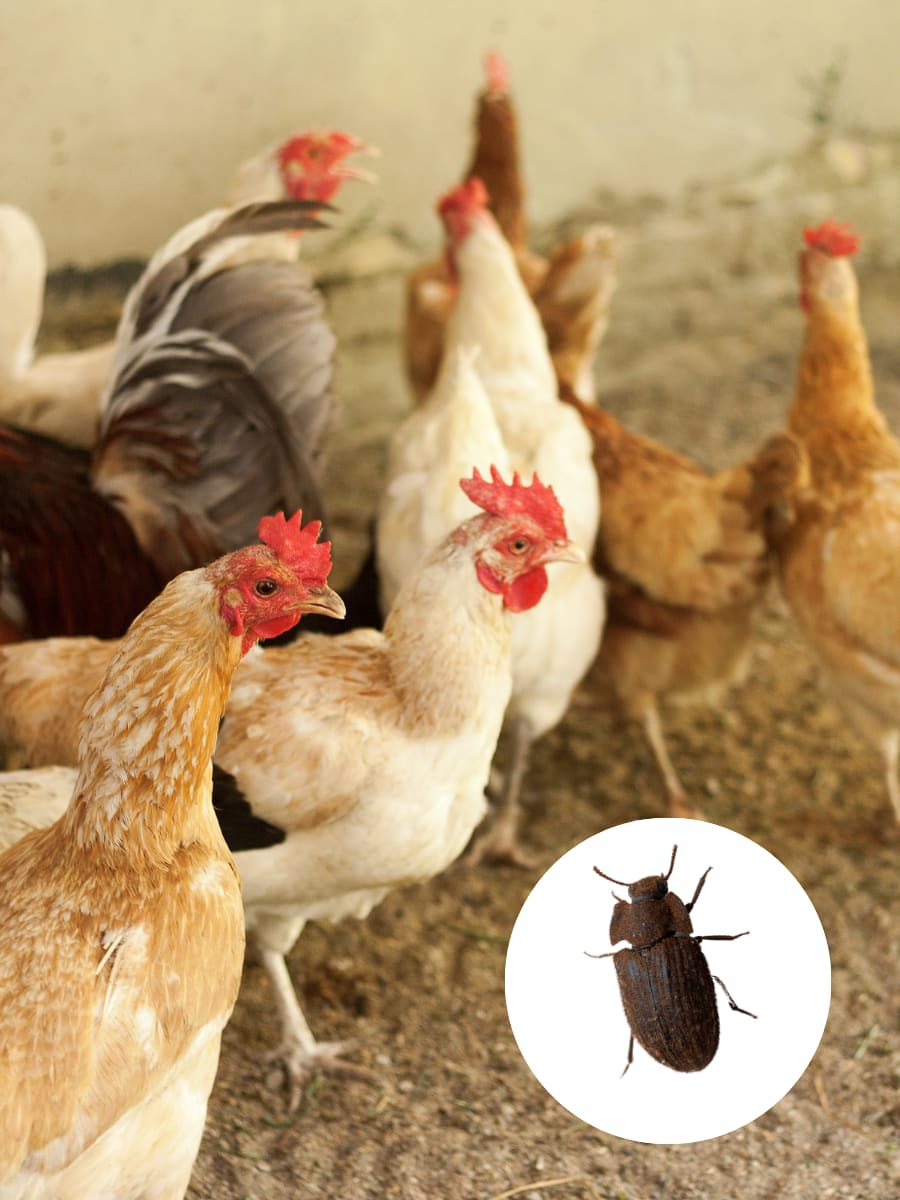Problems Posed by Darkling Beetles

Darkling beetles are a common nuisance that can cause significant damage to poultry houses. It is crucial to understand the problems they pose in order to effectively control their populations and maintain a healthy and hygienic environment. These beetles have the ability to transmit diseases and parasites to chickens, which can severely impact the chickens' overall health and productivity.
A darkling beetle population can thrive in a poultry house because darkling beetles are attracted to moisture and food sources. The combination of a damp environment and an abundance of feed makes chicken houses an ideal habitat for these pests.
Darkling beetles have a tendency to hide in cracks and crevices, making them difficult to eliminate without proper pest control measures. Implementing effective pest control measures is essential to prevent infestations and minimize the risk of damage caused by darkling beetles.
In the United States, darkling beetle infestations are a common problem in the poultry industry. Therefore, it is important for chicken owners and farmers to be aware of the risks associated with these pests and take the necessary steps to prevent and control their presence. By understanding the problems posed by darkling beetles and implementing appropriate pest control measures, chicken owners can ensure a healthier and more productive environment for their flocks.
Characteristics of Darkling Beetles

Darkling beetles are quite distinctive in their appearance and behavior. These small insects have elongated bodies and come in shiny black or dark brown colors.
One of their unique characteristics is the presence of hardened forewings that cover their hindwings, which gives them a flattened look.
During the day, darkling beetles prefer hiding in crevices, cracks and other dark areas, making them quite elusive. They are primarily active at night and are often attracted to light sources.
By recognizing these identifying characteristics, you can not only differentiate darkling beetles from other pests but also monitor their populations effectively. Prevention and early detection are key in managing darkling beetle populations, ensuring a pest-free environment.
Lifecycle of Darkling Beetles

Darkling beetles are called mealworms in their larval stage. They undergo a complete metamorphosis, progressing through several stages before becoming adult beetles.
Starting as eggs, darkling beetles hatch into larvae. These mealworms are the most damaging and challenging to control.
Darkling beetle larvae have a voracious appetite and feed on organic matter, such as chicken feed, animal feces and decaying materials. Their feeding habits make them a nuisance in homes and chicken houses alike.
As mealworms mature, they enter the pupal stage where they transform inside a cocoon-like structure. During this stage, they undergo significant changes and eventually emerge as adult darkling beetles.
Natural Darkling Beetle Control: Desecticide

To control darkling beetles, we recommend Desecticide. As a non-toxic poultry spray, Desecticide is proven effective for killing resistant darkling beetles, lesser mealworms, bed bugs, mites, fleas and ticks on chickens, ducks and turkeys.
Safety
Desecticide is all-natural and non-toxic. It contains no harsh chemicals, so it won't harm you or your pets. You can spray it with birds present or even spray it on your birds, and they will be unharmed.
Since Desecticide is non-toxic, you don't need a license to spray it. Anyone can apply Desecticide at any point.
Effectiveness
Desecticide is a highly effective solution for controlling darkling beetles. It targets all stages of their lifecycle and when used regularly, reduces beetle numbers and prevents infestations. Combined with proper sanitation practices, it offers a reliable and sustainable option for darkling beetle control in chicken houses.
Contact Kill
Desecticide is a non-residual contact kill spray. This means you need to spray bugs directly to kill them. When you do, the bugs will die!
Desecticide works through its main ingredients of oils and soaps. The oils act as a toxin to the bug, and the soap makes those oils stick so the bugs die. While Desecticide does not provide a residual kill, its smell (which smells good to us humans!) is a deterrent to bugs.
FIFRA 25B Exempt
You may also like to know that Desecticide is FIFRA 25B exempt. This means the U.S. Environmental Protection Agency (EPA) has deemed it "Generally Regarded As Safe" (GRAS). It's recognized as posing little to no threat to the applicator or the environment.
How to Apply
Always start by diluting Desecticide. Start with the water first, and then add in Desecticide. If you add the water to the Desecticide, you will have foam. There is no need for agitation. Simply mix and spray!
For commercial poultry growers, mix 1 gallon of Desecticide with 10 gallons of water to cover 5,000 square feet. For a 20,000 square foot house, mix 4 gallons of product with 40 gallons of water.
For backyard or small scale applications, mix 6 oz. of Desecticide with a ½ gallon of water to cover 250 square feet.
Since Desecticide kills on contact, you can apply it whenever you begin to see a pest problem, like when bugs lay eggs. Reapply Desecticide whenever bugs are present.
Learn more and purchase Desecticide here.
Prevent a Darkling Beetle Infestation
Darkling beetles' ability to reproduce quickly and infest spaces can lead to damage and health risks. Desecticide offers an effective solution to control darkling beetles and prevent infestations. With its safe and practical approach, you can trust Desecticide for reliable darkling beetle control.
Contact Us
We would love to help you get rid of darkling beetles with Desecticide. If you have any questions, reach out to us at success@southlandorganics.com or 800-608-3755. Don’t forget to subscribe to our YouTube channel for more helpful information.





